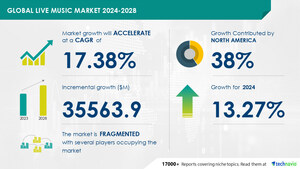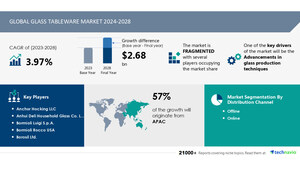NEW YORK, June 5, 2024 /PRNewswire/ -- The global geothermal heat pump market size is estimated to grow by USD 5.65 billion from 2024-2028, according to Technavio. The market is estimated to grow at a CAGR of over 8.46% during the forecast period.
For comprehensive forecast and historic data on regions, market segments, customer landscape, and companies- Click for the snapshot of this report
Forecast period |
2024-2028 |
Base Year |
2023 |
Historic Data |
2018 - 2022 |
Segment Covered |
End-user (Residential and Non-residential), Type (Closed loop system and Open loop system), and Geography (Europe, North America, APAC, South America, and Middle East and Africa) |
Region Covered |
Europe, North America, APAC, South America, and Middle East and Africa |
Key companies profiled |
Bard HVAC, Carrier Global Corp., Daikin Industries Ltd., Dandelion, Danfoss AS, Energy Smart Alternatives., GeoSmart Energy, Glen Dimplex Group., Griffiths Air Conditioning and Electrical Contractors, Johnson Controls International Plc., Kensa Group, Mitsubishi Corp., NIBE Industrier AB, REMKO GmbH and Co. KG, Robert Bosch GmbH, Sirac Air Conditioning Equipments Co. Ltd., Stiebel Eltron GmbH and Co. KG, Trane Technologies Plc, Vaillant GmbH, and Viessmann Climate Solutions SE |
Key Market Trends Fueling Growth
The global market for Geothermal Heat Pumps is expanding due to the increasing demand for energy efficiency and cost savings in both residential and commercial sectors. Building Energy Management Systems (BEMS) are driving this growth, with countries like the US and China leading the way through energy labels and regulations.
Challenges such as high initial costs and low ROI are being addressed through technological innovations and declining monitoring device costs. BEMS's ability to reduce CO2 emissions and promote eco-friendliness is also boosting the market. Market leaders like Schneider Electric and Siemens are capitalizing on this trend, making it an attractive industry for new players.
The Geothermal Heat Pump market is experiencing significant growth due to the increasing demand for renewable energy sources. Closed-loop systems and horizontal systems are popular choices in this market. Geothermal heat pumps use the earth's natural heat to generate warmth in winter and cool air in summer.
The technology is eco-friendly and energy-efficient, making it an attractive option for businesses and homeowners. The trend towards sustainability and reducing carbon footprints is driving the growth of this market. Additionally, government incentives and subsidies are boosting the adoption of geothermal heat pumps. Overall, the future looks bright for the Geothermal Heat Pump industry.
Market Challenges
- The geothermal heat pump market faces a significant challenge due to the high upfront costs of installing geothermal systems. Factors contributing to this expense include the requirement for specialized drilling equipment and underground piping systems, as well as potential electrical system upgrades.
- To mitigate this issue, governments and industry leaders are providing tax incentives, rebates, and financing models to make geothermal systems more affordable. Despite these efforts, the high initial investment may deter potential customers, particularly in areas where conventional heating and cooling systems are less expensive, potentially impacting market growth during the forecast period.
- The geothermal heat pump market faces several challenges in its implementation and growth. Costs, such as installation and configuration, are significant barriers for businesses and individuals. Location plays a crucial role, as not all areas have the necessary geothermal resources.
- Additionally, the technology's efficiency can be affected by local climate conditions. Furthermore, regulations and incentives vary greatly from region to region, making it challenging to standardize the market. Lastly, the competition from other heating and cooling solutions, like traditional HVAC systems, can limit the market's expansion. Despite these challenges, the geothermal heat pump industry continues to innovate and improve, offering long-term energy savings and environmental benefits.
Research report provides comprehensive data on impact of trend, driver and challenges - Download a Sample Report
Segment Overview
- End-user
- 1.1 Residential
- 1.2 Non-residential
- Type
- 2.1 Closed loop system
- 2.2 Open loop system
- Geography
- 3.1 Europe
- 3.2 North America
- 3.3 APAC
- 3.4 South America
- 3.5 Middle East and Africa
1.1 Residential- The residential segment, the largest in the geothermal heat pump market, is driven by the recovery of the construction industry and the expanding need for energy-efficient solutions. The global housing market's growth significantly contributes to this sector, with increasing residential prices in certain regions and declining prices in others. Government initiatives and tax incentives further boost demand for energy-saving products, including geothermal heat pumps. Urbanization also fuels the need for residential housing, leading to market expansion during the forecast period.
For more information on market segmentation with geographical analysis including forecast (2024-2028) and historic data (2018 - 2022) - Download a Sample Report
Research Analysis
The Geothermal Heat Pump (GHP) market encompasses both closed-loop and open-loop systems, each offering unique advantages. Closed-loop GHPs, featuring interconnected pipes filled with an antifreeze solution, provide low maintenance costs and high durability due to their sealed nature. Vertical closed-loop configurations are particularly efficient in areas with limited space, while horizontal configurations require more space.
The ground acts as the heat source, with loops transferring heat from the ground to the building. Renewable energy derived from geothermal heat can significantly reduce heating costs compared to traditional methods. Open-loop GHPs, on the other hand, utilize water from sources such as wells, lakes, or rivers, making them suitable for areas with abundant water resources. The GHP market continues to grow as the world seeks sustainable and cost-effective heating solutions.
Market Research Overview
The Geothermal Heat Pump market refers to the industry that produces and installs systems used to harness the earth's natural heat for heating and cooling purposes. These systems, also known as ground-source heat pumps, use the earth's consistent temperature to provide thermal energy. The market for geothermal heat pumps is growing due to their energy efficiency and environmental benefits. The technology involves extracting heat from the ground through a series of pipes filled with a working fluid. The heat is then transferred to a heat exchanger where it is used to heat water or air for distribution.
The market for geothermal heat pumps is driven by increasing energy prices, government incentives, and growing awareness of renewable energy sources. The systems have a long lifespan and require minimal maintenance, making them a cost-effective solution for both residential and commercial applications. The market for geothermal heat pumps is expected to continue growing as more people turn to renewable energy sources to reduce their carbon footprint.
Table of Contents:
1 Executive Summary
2 Market Landscape
3 Market Sizing
4 Historic Market Size
5 Five Forces Analysis
6 Market Segmentation
- End-user
- Residential
- Non-residential
- Type
- Closed Loop System
- Open Loop System
- Geography
- Europe
- North America
- APAC
- South America
- Middle East And Africa
7 Customer Landscape
8 Geographic Landscape
9 Drivers, Challenges, and Trends
10 Company Landscape
11 Company Analysis
12 Appendix
About Technavio
Technavio is a leading global technology research and advisory company. Their research and analysis focuses on emerging market trends and provides actionable insights to help businesses identify market opportunities and develop effective strategies to optimize their market positions.
With over 500 specialized analysts, Technavio's report library consists of more than 17,000 reports and counting, covering 800 technologies, spanning across 50 countries. Their client base consists of enterprises of all sizes, including more than 100 Fortune 500 companies. This growing client base relies on Technavio's comprehensive coverage, extensive research, and actionable market insights to identify opportunities in existing and potential markets and assess their competitive positions within changing market scenarios.
Contacts
Technavio Research
Jesse Maida
Media & Marketing Executive
US: +1 844 364 1100
UK: +44 203 893 3200
Email: [email protected]
Website: www.technavio.com/
SOURCE Technavio

WANT YOUR COMPANY'S NEWS FEATURED ON PRNEWSWIRE.COM?
Newsrooms &
Influencers
Digital Media
Outlets
Journalists
Opted In






Share this article